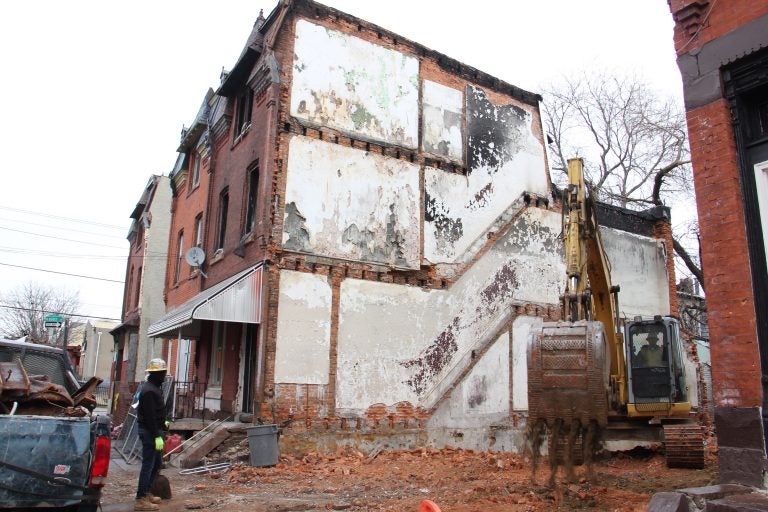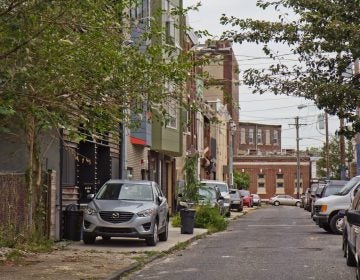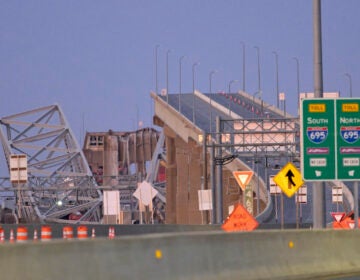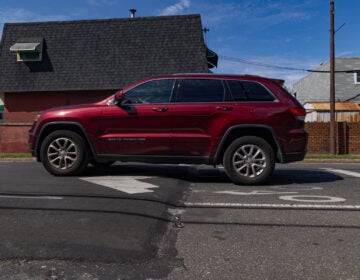Can better informed residents make neighborhoods safer, Philly Councilwoman asks with new bill
After a fire killed four residents of an illegal rooming house in North Philly last month, city leaders are wrestling with how to prevent similar tragedies from striking.

A backhoe works on the lot adjacent to 1855 N. 21st St., an illegal boarding house where 10 people are believed to have lived before a deadly fire struck last week. (Emma Lee/WHYY)
On the heels of a fire that killed four residents of an illegal rooming house in North Philadelphia last month, city leaders are wrestling with how to prevent similar tragedies from striking in the future. It’s a complicated problem to solve in a poor city with hundreds of thousands of aging rowhomes and steady demand for inexpensive housing, but City Councilwoman Cindy Bass thinks there is at least one step that can be taken now: keeping residents more informed about development and zoning in their neighborhoods.
At a council meeting on Thursday, Bass introduced a bill to require property developers seeking a change in zoning to send certified letters to “near neighbors” within a 300-foot radius of the property in question, in addition to the notifying the area’s Registered Community Organization and local councilperson. The bill would reform a 2012 law that required developers seeking a rezoning to alert a smaller number of “immediate neighbors.” It would also require a two-square-foot corrugated cardboard signs advertising the proposed change to alert passersby. The sign would replace the 8-by 11-inch orange sticker now mandated to be posted on the property.
“A lot of times, neighbors do not attend public… meetings and do not get a chance to witness presentations by hopeful developers simply because they are unaware of the scheduled meeting. Sometimes it’s an oversight, but sometimes it’s a way to intentionally keep neighbors in the dark,” Bass said in a public statement introducing the legislation.
Bass characterizes the bill as a common-sense reform that would allow community residents to keep tabs on what’s happening in their neighborhood, including the potential development of rooming houses like the one that burned in the deadly fire last month.
But others in city government and the real estate industry say the bill won’t solve the problem of unsafe housing and could, in fact, make it worse, by making it harder for people to develop new units. After all, the rooming house consumed by fire in March was operating without a rental license and in violation of the zoning. The property owner didn’t follow the existing zoning process; why would he adhere to a more rigorous process?
Philadelphia developer James Maransky leads the Building Industry Association of Philadelphia, an advocacy group with a mission to create more market-rate housing in the city. He describes the bill as part of a barrage of new or proposed city policies placing greater burdens on real estate development in the city. Mailing a certified letter costs more than $3.50, and applicants would have to send two rounds of certified mail, one about the requested variance and another about the public meeting where neighbors can hear about it. In densely populated neighborhoods, the new expenses could add a couple of thousand dollars to the cost of a project.
“We feel like we are playing defense all the time,” said Maransky. “It seems like it’s been a pretty strong effort against the development community this past year. So anything that adds additional costs to development we need to take a good hard look at it before agreeing to.”
The bill would also require the Planning Commission to mail notices to residents when they are affected by a remapping bill passed by City Council. While many cities require such notices, the onus of reaching out to those affected is usually on the legislative body that introduces the bills, not the Planning Commission.
The regulatory tweak could create a major headache for the commission. For instance, if the inclusionary zoning billproposed last year had been passed, the commission would have been required to send mail to every residential property in the city.
“I see what you are saying, and that is a very good point,” said Christian Matozzo, special assistant to Bass. “We need to have more discussions with the Planning Commission in terms of the ramifications of the legislation. But ultimately, when your specific property is rezoned, we want you to get a notification.”
Bass’s office is working on other reforms that the councilwoman hopes could help the city improve its track record on housing safety. These could include new regulations such as mandating a property inspection before the issuance of a rental license and establishing a fee for those inspections, to cover costs for the many additional inspectors needed for such a regimen.
“These reforms will be cost neutral to the City and, most importantly, they will save lives,” said Bass in her press release.
The councilwoman hasn’t yet set a timeline for introducing the proposed new bills. A spokesperson said that Bass is first interested in starting a conversation with all relevant parties.
WHYY is your source for fact-based, in-depth journalism and information. As a nonprofit organization, we rely on financial support from readers like you. Please give today.







